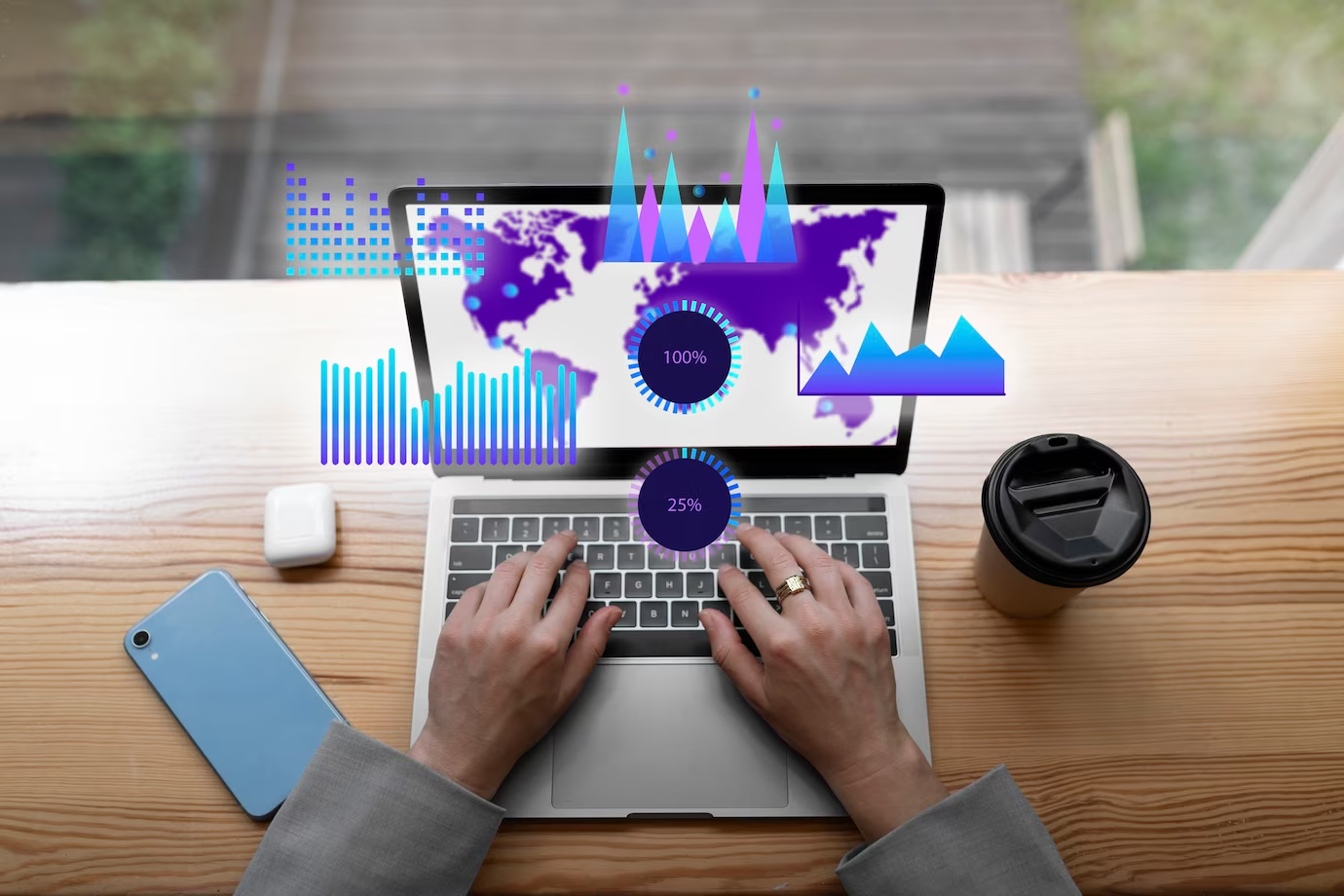Emerging Trends in Agency Services
The marketing agency landscape has undergone significant transformations in recent years, driven by evolving client needs, technological advancements, and shifts in consumer behavior. As businesses increasingly demand more specialized and agile services, agencies are adapting to stay competitive in a fast-paced, digital-first environment. In 2024, several key trends are emerging that are reshaping the way agencies operate and deliver value to their clients. Let’s explore these trends and understand how they are redefining agency services.
1. Data-Driven Strategies
One of the most significant emerging trends in agency services is the increasing reliance on data-driven strategies. As businesses strive to improve their marketing efficiency and ROI, agencies are utilizing advanced analytics to offer more precise, measurable, and actionable insights. The days of relying on gut feeling and intuition are long gone—today, agencies are leveraging data to inform every aspect of their marketing campaigns, from initial planning to execution and optimization.
- Predictive Analytics: Predictive analytics helps agencies anticipate customer behavior and make informed decisions. By analyzing past customer data, agencies can predict future trends, helping brands to stay ahead of market shifts and consumer preferences.
- Personalization through Data: Clients expect hyper-personalized experiences, and data enables agencies to deliver tailored content, ads, and recommendations. This not only enhances customer engagement but also increases conversion rates.
- Real-Time Reporting: Clients are demanding more transparency and accountability, leading agencies to offer real-time performance reporting. This allows brands to make quick adjustments to campaigns, maximizing the impact of their marketing spend.

As data continues to be the foundation of modern marketing strategies, agencies that invest in sophisticated analytics tools and talent will be better equipped to serve their clients.
2. Emphasis on Niche Expertise
Another emerging trend is the growing demand for niche expertise. With the rise of specialized industries and targeted marketing, businesses are seeking agencies that can offer deep knowledge and tailored solutions for their specific sectors. This is particularly evident in fields such as healthcare, fintech, e-commerce, and SaaS (Software as a Service), where nuanced understanding of industry regulations, customer behavior, and technology is critical for success.
- Industry-Specific Agencies: Agencies that position themselves as experts in a particular industry can command higher fees and attract long-term clients. They offer specialized insights and strategies that generalist agencies may not have the capacity to provide.
- Tailored Content and Messaging: Niche agencies develop content and messaging that resonates with specific audiences. Whether it’s creating ad campaigns for pharmaceutical companies or designing digital strategies for B2B tech firms, these agencies provide highly customized services that meet the unique needs of their clients.
- Localized Expertise: As businesses expand into new markets, the need for localized expertise is also rising. Agencies with knowledge of local regulations, cultural nuances, and consumer behaviors are increasingly in demand for brands looking to scale globally.

Specialization allows agencies to offer more value to their clients by providing deep expertise and a focused approach, making them indispensable partners.
3. Integration of AI and Automation
Artificial Intelligence (AI) and automation are revolutionizing agency services by enhancing efficiency, creativity, and decision-making. Agencies are increasingly incorporating AI into their operations to streamline processes, analyze data, and improve client outcomes.
- AI-Powered Tools: AI tools are being used to automate tasks such as keyword research, content creation, and ad targeting. This not only reduces time spent on repetitive tasks but also allows agencies to allocate more resources to strategy and innovation.
- Chatbots and Customer Support: Many agencies are implementing AI-driven chatbots to handle customer inquiries, schedule meetings, and provide real-time support. This enables agencies to enhance client communication without overwhelming their human workforce.
- Creative AI: AI is also playing a role in the creative aspects of agency work. Tools like design generators and content creation algorithms are being used to produce on-brand visuals, videos, and copy at scale, while still maintaining a high level of creativity and customization.

- Automation in Campaign Management: Automation platforms allow agencies to monitor and optimize campaigns in real time. Whether it's adjusting ad spend based on performance metrics or sending personalized emails based on user behavior, automation ensures campaigns are always running at peak efficiency.
As AI technology continues to evolve, agencies will find new ways to integrate these tools into their workflow, enhancing both their efficiency and the quality of the services they offer.
4. Agility and Flexibility
In a world where market conditions and consumer behavior can shift rapidly, agility has become a crucial trait for agencies. Clients now expect their agency partners to be able to pivot quickly, adapt to changing circumstances, and deliver fast results. The rise of agile marketing methodologies is helping agencies meet these demands.
- Agile Marketing: Agile marketing involves iterative campaigns that can be adjusted based on real-time feedback. Instead of committing to large, rigid campaigns, agencies are adopting smaller, testable initiatives that can be scaled or refined as needed. This ensures that campaigns stay relevant and effective, even as conditions change.
- Flexible Service Offerings: Agencies are increasingly offering flexible service models, allowing clients to choose from project-based, retainer, or à la carte services depending on their specific needs. This flexibility helps businesses manage their budgets more effectively and ensures they’re only paying for what they need.
- Cross-Functional Teams: Many agencies are moving toward cross-functional teams that can work on multiple aspects of a campaign at once. By bringing together experts in strategy, design, data analysis, and execution, agencies are able to deliver more cohesive and efficient services.

This focus on agility allows agencies to better respond to client needs and deliver campaigns that are both timely and impactful.
5. Sustainability and Ethical Marketing
As consumers become more conscious of the environmental and social impact of the brands they support, agencies are facing growing pressure to adopt sustainable and ethical marketing practices. Brands are increasingly looking to partner with agencies that prioritize corporate social responsibility (CSR) and ethical behavior in their campaigns.
- Sustainability-Focused Campaigns: Many agencies are developing campaigns that highlight their clients’ sustainability efforts, such as eco-friendly products, sustainable sourcing, or charitable initiatives. This not only boosts brand reputation but also resonates with today’s socially conscious consumers.
- Ethical Advertising Practices: In addition to sustainability, agencies are focusing on ethical advertising practices by promoting honesty, transparency, and inclusivity in their campaigns. This includes avoiding misleading claims, ensuring diversity in advertising content, and prioritizing accessibility.
- Green Certifications: Agencies that adopt sustainable practices, such as reducing their carbon footprint or using eco-friendly production methods, are more likely to attract clients who value environmental responsibility.

As ethical consumerism grows, agencies that integrate sustainability into their services will stand out as forward-thinking and socially responsible partners.
Conclusion
The agency landscape is evolving rapidly, driven by the need for data-driven insights, niche expertise, AI integration, agility, and sustainability. Agencies that can adapt to these trends will be well-positioned to meet the demands of modern businesses and deliver impactful, future-proof marketing solutions. At LumoVibe, we are committed to staying ahead of these trends, offering innovative and tailored marketing services that help our clients thrive in an ever-changing market. By embracing these emerging trends, agencies can not only stay competitive but also offer clients the cutting-edge services they need to succeed.
